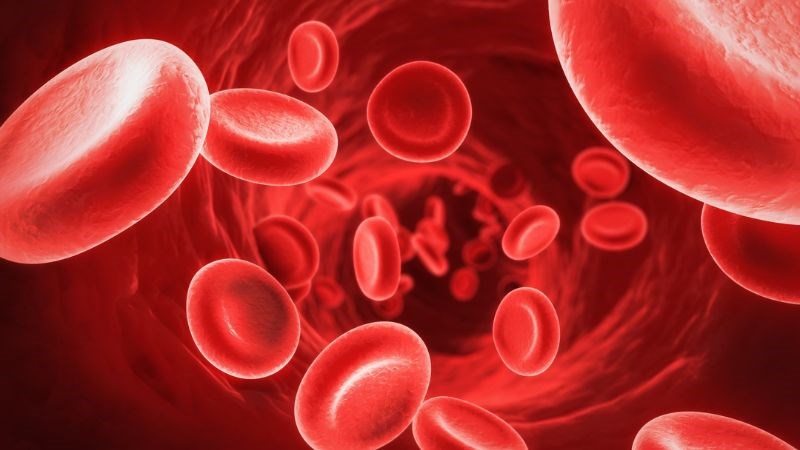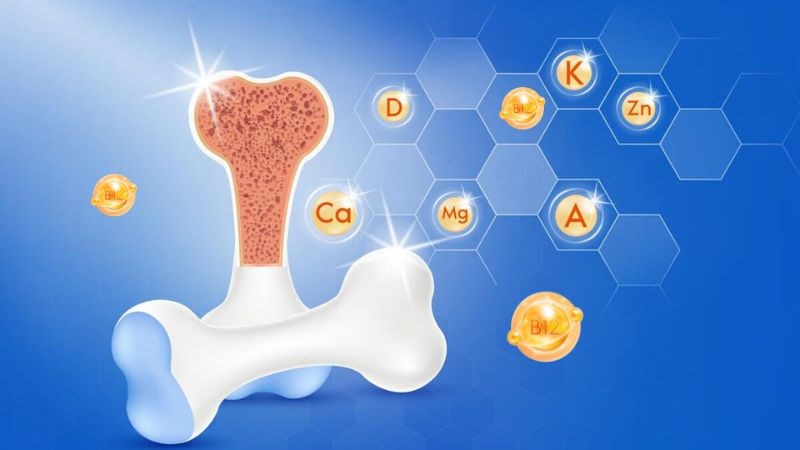Vitamin B12 is a trace element necessary for the production of red blood cells and the development of human brain function. So what is vitamin B12? Let’s find out through the following article!
1 What is Vitamin B12?
Vitamin B12 (cobalamin) is a water-soluble B vitamin. Vitamin B12 plays an important role in the process of creating red blood cells, producing DNA, forming nerve-transmitting cells and maintaining basic brain functions.
Vitamin B12 is found in many foods of animal origin such as chicken, fish, eggs, milk, etc. or can also be synthesized in the laboratory. Vitamin B12 exists mainly in the form of cyanocobalamin and is converted by the body into the active form – methylcobalamin.
Vitamin B12 deficiency is common in vegetarians, because plants do not contain vitamin B12. The elderly or people with poor digestive absorption problems are also susceptible to vitamin B12 deficiency.
If vitamin B12 deficiency persists without treatment, it can lead to anemia, fatigue, muscle weakness, nerve damage and anxiety disorders

Vitamin B12 is an essential vitamin for the body.
2 The role of vitamin B12 in the body
Preventing birth defects
Many studies have shown that vitamin B12 deficiency in early pregnancy increases the risk of birth defects in the brain and spinal cord, especially neural tube defects. Women with blood vitamin B12 levels lower than 250 mg/dL are 3 times more likely to give birth to a child with birth defects.
In addition, pregnant women with vitamin B12 deficiency are also more likely to have a miscarriage or premature birth. It can be seen that vitamin B12 is very important in preventing birth defects and is an essential nutrient for a healthy pregnancy.
Reduced risk of macular degeneration
High levels of the amino acid homocysteine have been linked to an increased risk of age-related macular degeneration. Researchers believe that adequate intake of the essential vitamin B12 may reduce homocysteine levels in the blood, which may help prevent the development of age-related macular degeneration.
Prevention and treatment of depression
Vitamin B12 plays a role in synthesizing and metabolizing serotonin, a hormone that regulates emotions. Therefore, a deficiency in vitamin B12 can reduce serotonin production and lead to depressive symptoms such as sadness, depression, anxiety, etc.
A study has shown that people with depression who use a combination of vitamin B12 and antidepressants have better treatment results than those who only use antidepressants.
Thus, vitamin B12 not only has the effect of preventing depression but also has the ability to support treatment very well
Maintaining Brain Health
Vitamin B12 is an essential nutrient for the formation of nerve cells in the brain. Vitamin B12 deficiency can lead to brain atrophy (loss of nerve cells) and is often followed by memory loss or dementia, especially in older adults.
In fact, when older adults with early-stage dementia were given vitamin B12 supplements to reduce homocysteine in their blood, the rate of cognitive decline was slowed.
Forming red blood cells and preventing anemia
Vitamin B12 participates in the production of red blood cells. In the case of vitamin B12 deficiency, red blood cells develop abnormally, with uneven shapes, hindering their ability to move from the bone marrow into the blood and causing megaloblastic anemia.
When you have anemia, your body does not have enough red blood cells to transport oxygen to nourish the organs, which will make the whole body tired and weak. Therefore, you need to provide enough vitamin B12 for the body as a source of raw materials to synthesize blood cells.

Vitamin B12 is involved in the production of red blood cells.
Strengthening Bones
A study looking at people with celiac disease found that low blood levels of vitamin B12 were associated with reduced bone density in the thigh and hip bones of men. This increased the risk of osteoporosis and made bones more susceptible to fractures.
Maintaining stable levels of vitamin B12 can help strengthen bones and prevent bone diseases such as osteoporosis, osteomalacia,…

Maintaining stable vitamin B12 levels may help keep bones strong
Boost Energy
Vitamin B12 is involved in the body’s energy production process. Getting enough vitamin B12 can help improve your energy levels. In fact, the first signs of vitamin B12 deficiency are fatigue and lack of vitality.
Improve cardiovascular health
When the body is deficient in vitamin B12, homocysteine levels in the blood increase, which is associated with an increased risk of cardiovascular disease.
Replenishing the deficient vitamin B12 can reduce the amount of the amino acid homocysteine, thereby improving cardiovascular function and reducing the risk of cardiovascular disease
Supports healthy skin, nails, and hair
Vitamin B12 participates in the production of cells – the building blocks of skin, nails, and hair. People with vitamin B12 deficiency often have symptoms of nail discoloration, hair discoloration, dermatitis at the corners of the mouth, hyperpigmentation, or vitiligo.
Studies have shown that vitamin B12 supplementation can improve dermatological symptoms in people with vitamin B12 deficiency
3 Sources of Vitamin B12
Food
Vitamin B12 is found in foods of animal origin such as: beef, beef liver, pork, fish, clams, poultry, eggs, ham, milk and dairy products (cheese, yogurt, etc.). In addition, vitamin B12 is also found in some nutritional yeast products and cereals.

Vitamin B12 is found mainly in foods of animal origin.
Supplements
Some people have difficulty absorbing or metabolizing vitamin B12 from food and need to supplement it with oral or injectable supplements. However, there are many places on the market that produce vitamin B12 supplements of unknown origin.
Therefore, you need to buy the product at large pharmacies, which provide reputable quality products and have good product storage conditions. Moreover, at pharmacies, you can receive advice on dosage and how to use vitamin B12 properly from pharmacists.
4 Dosage & Administration
Depending on age, eating habits, health conditions, and medications, the amount of vitamin B12 needed will vary. The amount of vitamin B12 below is the average amount recommended by the U.S. Centers for Disease Control and Prevention (U.S. CDC):
- Infants up to 6 months: 0.4 mcg;
- 7-12 months: 0.5 mcg;
- Children 1-3 years: 0.9 mcg;
- Children 4-8 years: 1.2 mcg;
- Children 9-13 years: 1.8 mcg;
- Adolescents 14-18 years: 2.4 mcg (2.6 mcg daily if pregnant and 2.8 mcg daily if breastfeeding);
- Adults: 2.4mcg (2.6mcg daily if pregnant and 2.8mcg daily if breastfeeding).
5 Side Effects of Vitamin B12
Vitamin B12 is quite safe, when used in normal doses, side effects are very rare. Side effects of vitamin B12 occur when using too high doses such as:
- Skin diseases such as acne and dermatitis (rash).
- Using doses of vitamin B above 1000mcg can easily lead to vascular events in people with kidney disease.
- High blood levels of vitamin B12 in pregnant women can increase the risk of autism in children later.
- Allergic reactions to vitamin B12 supplements are very rare, some allergic reactions have been reported and can cause symptoms such as swelling, itchy skin and anaphylactic shock.
Hopefully through this article you have gained more useful information about the role of vitamin B12 in the body as well as how to use vitamin B12 safely and appropriately.





